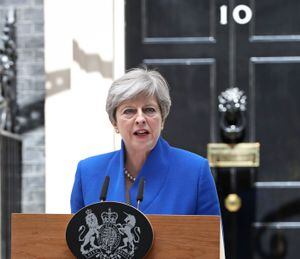Shirley Tart: Neither May nor Corbyn has won the day
As Labour’s chances rose the PM’s ‘strong and stable’ promise turned a bit tame. Shirley Tart asks what went so spectacularly wrong.

Two months ago, the Prime Minister stood before the nation and announced a snap election. Despite criticism from many, she was calm, measured, stable and persuasive.
And as campaigning continued, comments waiting to be aired this weekend were obvious.
Either: “It’s back to business with a thumping majority for a victorious Theresa.”
Or: “What now for Theresa as Corbyn romps past her to the winning post?”
Well now we know which observation finally won the day. Neither of them!
The new mandate which Mrs May had sought, proved to be one of loss and not of the gain she wanted so that she felt fully supported to lead the long-awaited entrance into Brexit.
Post-election, Theresa May was still wearing her Prime Minister’s shoes, as it were, and while her presentation was sober and measured, the disappointment and concerns for the future, must have been eating away just below the surface.
So what now? Will her reign as Britain’s second female Prime Minister end as swiftly as it began? Well, she wasted no time in seeking the Queen’s permission to form a government, then went back to Downing Street to appoint a new Cabinet. And talks with the Democratic Unionist Party were swiftly opened.
Theresa May rarely talks about herself – having interviewed her, I can vouch for that – but opened up during this campaign, albeit modestly. She talked about her childhood, teenage and student days, her early career, going into politics - and her marriage to Philip, the love of her life.
She can be steely-firm. Yet during this campaign, as Jeremy Corbyn rose day by day up the rankings, she somehow became a tad hesitant and the ‘strong and stable’ promise turned a bit tame, a touch uninspiring. So what on earth went wrong?
Campaigning is a tiring, sometimes thankless job but it’s the same for all candidates and Mrs May appears to handle it pretty well – especially given her health issues. That she hardly mentioned the Conservative party in speeches, keeping it personal, probably didn’t help
But it must have been more than that. And perhaps the best that can come from it all is a sharp lesson learned.
One commentator says that Mrs May ‘doesn’t do gossiping in the tea rooms, she is a bit posh, a bit of an urban metro.’
She is not the first to make a huge miscalculation. This next big test is how she deals with it.





